形容词比较级总结
小学英语形容词比较级总结大全

英语形容词比较级(一)一般句式的构成:A + is / are+ 形容词比较级+ than + BA 是主格B 是宾格如:She is taller than me.主格+ be + 形容词比较级+ than + 宾格(二)英语形容词比较级的构成英语形容词比较等级有三个:原级,比较级和最高级。
形容词比较等级形式变化有规则的和不规则的两种。
规则变化:1)单音节词末尾加-er(比较级),-est(最高级)【例】原级比较级最高级great greater greatestsmall smaller smallestclean cleaner cleanest2)单音节如以e结尾,只加-r(比较级),-st(最高级)【例】fine finer finestnice nicer nicestwide wider widest3)闭音节单音节词如末尾只有一个辅音字母,须先双写这个辅音字母,再加-er (比较级),-est(最高级)【例】big bigger biggesthot hotter hottestred redder reddest4)少数以-y,-er,ow,-ble结尾的双音节词,末尾加-er(比较级),-est(最高级)。
以-y结尾的词,如-y前是辅音字母,则变y为-i,再加-er和-est。
以-e结尾的词只加-r和-st。
【例】clever cleverer cleverestnarrow narrower narrowestable abler ablesteasy easier easiest5)其它双音节和多音节词皆在前面加单词more和most。
【例】careful more careful most carefuldifficult more difficult most difficultdelicious more delicious most delicious不规则变化:原级比较级最高级good/well better bestbad worse worstmany/much more mostlittle less leastfar farther/further farthest/furthest注:有些形容词一般没有比较等级。
英语形容词的比较级和最高级整理

英语形容词的比较级和最高级整理常规:1、一般直接在词尾加er;est.tall---taller---the tallestgreat---greater---the greatest2、以字母e结尾的直接加r;stnice---nicer---the nicestfine---finer---the finest3、以辅音字母加y结尾的形容词变y为i再加er;estbusy---busier---the busiestheavy---heavier---the heaviest4、重读闭音节结尾的单音节词,若词尾只有一个辅音字母时,须双写这个辅音字母再加er;estbig-bigger-the biggesthot -hotter-the hottest5、少数以-y,-er,-ow,-ble结尾的双音节词,末尾加-er^D-est(以-y 结尾的词,如-y前是辅音字母,则变y为i,再加-er和-est;以-e 结尾的词仍只加-r和-st)happy—happier—happiestclever—cleverer—cleverest5、多音节和部分双音节词在词前加more、mosteasily--more easily--most easilybeautiful--more beautiful--the most beautiful特殊:(1 )有些单音节词的比较等级常用more和most,如glad,fond,shy,sly(但like 只可用more 和most)。
Eg:I am not more glad than you.我可没像你那样高兴。
Uncle Jack was more like a book of reference to my father.杰克大叔对我父亲来说真是一部参考书。
(2)有些单音节词用-er和-est或more和most皆可,如free,clear 等。
Eg:I'm clearer/more clear about it than before.对这事,我比以前更清楚了。
六年级知识要点总结 形容词比较级知识总结
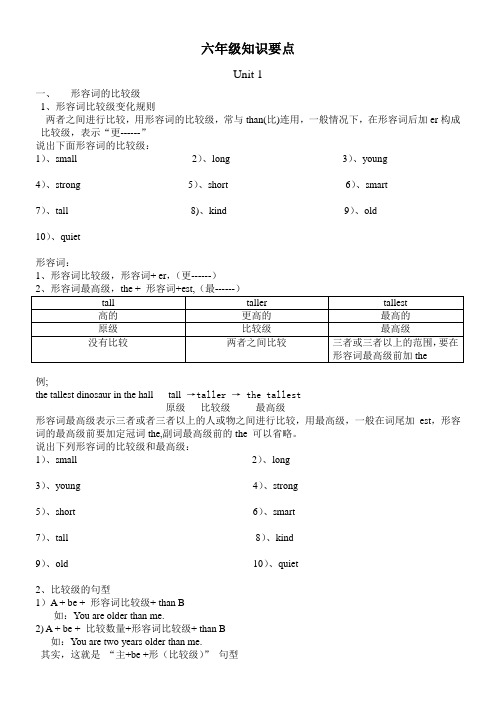
六年级知识要点Unit 1一、形容词的比较级1、形容词比较级变化规则两者之间进行比较,用形容词的比较级,常与than(比)连用,一般情况下,在形容词后加er构成比较级,表示“更------”说出下面形容词的比较级:1)、small __________ 2)、long __________ 3)、young __________ 4)、strong __________ 5)、short __________ 6)、smart __________ 7)、tall __________ 8)、kind __________ 9)、old __________ 10)、quiet __________形容词:1、形容词比较级,形容词+ er,(更------)例;the tallest dinosaur in the hall tall→taller → the tallest原级比较级最高级形容词最高级表示三者或者三者以上的人或物之间进行比较,用最高级,一般在词尾加est,形容词的最高级前要加定冠词the,副词最高级前的the 可以省略。
说出下列形容词的比较级和最高级:1)、small __________ __________ 2)、long __________ __________3)、young __________ __________ 4)、strong __________ __________5)、short __________ __________ 6)、smart __________ __________7)、tall __________ __________ 8)、kind __________ __________9)、old __________ __________ 10)、quiet __________ __________2、比较级的句型1)A + be + 形容词比较级+ than B如:You are older than me.2) A + be + 比较数量+形容词比较级+ than B如:You are two years older than me.其实,这就是“主+be +形(比较级)”句型知识拓展:比较级和最高级要同类之间进行比较Zhang Peng’s bag is bigger than Sarah’s bag. = Zhang Peng’s bag is bigger than Sarah’s. 名词所有格所修饰的词,如果前面有提到过,往往可以省略,避免重复。
形容词比较级常用词总结
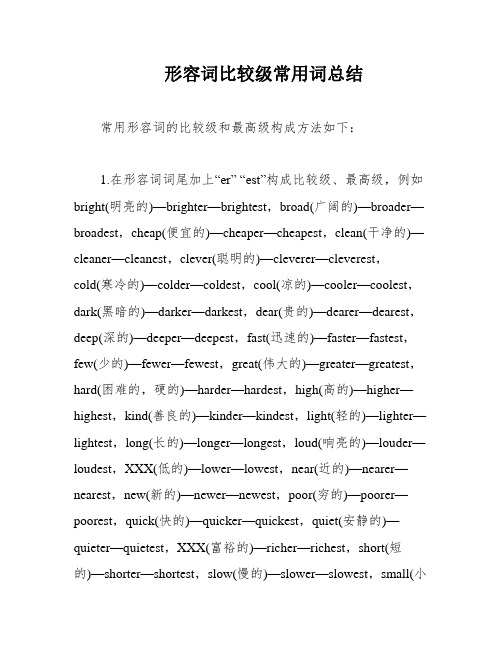
形容词比较级常用词总结常用形容词的比较级和最高级构成方法如下:1.在形容词词尾加上“er” “est”构成比较级、最高级,例如bright(明亮的)—brighter—brightest,broad(广阔的)—broader—broadest,cheap(便宜的)—cheaper—cheapest,clean(干净的)—cleaner—cleanest,clever(聪明的)—cleverer—cleverest,cold(寒冷的)—colder—coldest,cool(凉的)—cooler—coolest,dark(黑暗的)—darker—darkest,dear(贵的)—dearer—dearest,deep(深的)—deeper—deepest,fast(迅速的)—faster—fastest,few(少的)—fewer—fewest,great(伟大的)—greater—greatest,hard(困难的,硬的)—harder—hardest,high(高的)—higher—highest,kind(善良的)—kinder—kindest,light(轻的)—lighter—lightest,long(长的)—longer—longest,loud(响亮的)—louder—loudest,XXX(低的)—lower—lowest,near(近的)—nearer—nearest,new(新的)—newer—newest,poor(穷的)—poorer—poorest,quick(快的)—quicker—quickest,quiet(安静的)—quieter—quietest,XXX(富裕的)—richer—richest,short(短的)—shorter—shortest,slow(慢的)—slower—slowest,small(小的)—smaller—smallest,smart(聪明的)—smarter—smartest,soft(柔软的)—softer—softest,strong(强壮的)—stronger—strongest,sweet(甜的)—sweeter—sweetest,tall(高的)-taller-tallest。
形容词比较级归纳
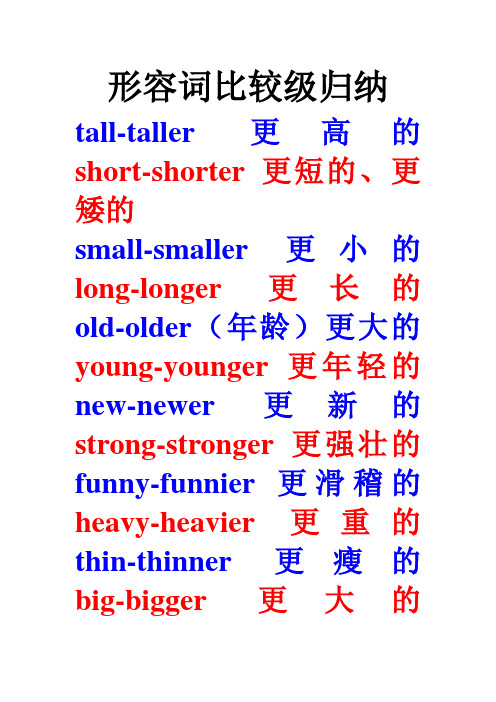
形容词比较级归纳tall-taller更高的short-shorter 更短的、更矮的small-smaller 更小的long-longer 更长的old-older(年龄)更大的young-younger 更年轻的new-newer 更新的strong-stronger 更强壮的funny-funnier 更滑稽的heavy-heavier 更重的thin-thinner 更瘦的big-bigger 更大的good/well-better 更好的many/much-more 更多的动词过去式归纳wash-washed 洗visit-visited 看望clean-cleaned 打扫watch-watched 看play-played 玩water-watered 浇水listen-listened 听cook-cooked 做(饭)walk-walked 走jump-jumped 跳return-returned 送回,归还climb-climbed 爬learn-learned 学习work-worked 工作ski-skied 滑雪row-rowed 划(船)relax-relaxed 放松show-showed 展示look-looked 看stay-stayed 待,停留ask-asked 问call-called 打(电话)taste-tasted 品尝dance-danced 跳舞prepare-prepared 准备arrive-arrived 抵达go skiing-went skiing 去滑雪go ice-skating-wentice-skating 去滑冰leave-left 离开get-got 得到,到达tell-told 告诉,讲述run-ran 跑say-said 说will-would 将要come-came 来lose-lost丢失find-found 找到drink-drank 喝wear-wore 穿,戴write-wrote 写do-did 做,干(助动词)go-went 去see-saw 看见am/is-was 是are-were 是read-read 读,阅读study-studied 学习fly-flew 放,飞swim-swam 游泳buy-bought 买take-took照,拍eat-ate 吃sing-sang 唱make-made 制作have/has-had 有,吃,举行,玩动词ing形式归纳do-doing 做、干read-reading 读draw-drawing 画cook-cooking 做(饭)ask-asking 问answer-answering 回答talk-talking 说listen-listening 听clean-cleaning 打扫wash-washing 洗wear-wearing 穿work-working 工作play-playing 玩watch-watching 观看sleep-sleeping 睡觉leap-leaping 跳跃fight-fighting 打架climb-climbing 爬fly-flying 飞jump-jumping跳walk-walking 走eat-eating 吃drink-drinking 喝swing-swinging 荡秋千look-looking 看pick-picking 采摘catch-catching 抓住collect-collecting 收集count-counting 数go-going 去sing-singingwrite-writing 写come-coming 来bite-biting 咬snore-snoring打呼噜take-taking 拍(照)have-having 吃、喝leave-leaving 离开ride-riding 骑drive-driving驾驶、开make-making 制作dance-dancing 跳舞live-living 居住dive-diving 跳水run-running 跑swim-swimming 游泳shop-shopping 购物put-putting 放动词第三人称单数形式归纳sell-sells 卖clean-cleans 打扫draw-draws 画work-works 工作like-likes 喜欢play-plays 玩write-writes 写see-sees 看见become-becomes 变成live-lives 居住feel-feels 感觉think-thinks 想、思考read-reads 读collect-collects 收集help-helps 帮助do-does 做、干go-goes 去teach-teaches 教watch-watches 观看wash-washes 洗try-tries 尝试fly-flies 飞cry-cries 哭have-has有are-is 是。
形容词比较级
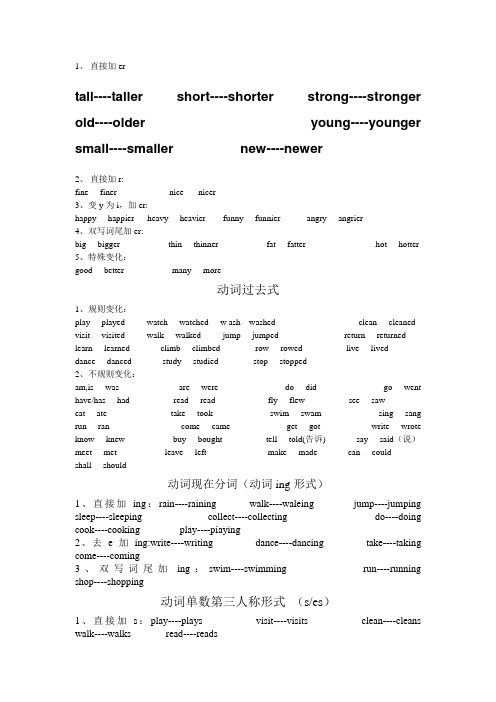
1、直接加ertall----taller short----shorter strong----stronger old----older young----younger small----smaller new----newer2、直接加r:fine----finer nice-----nicer3、变y为i,加er:happy----happier heavy----heavier funny----funnier angry----angrier4、双写词尾加er:big----bigger thin----thinner fat----fatter hot----hotter 5、特殊变化:good----better many----more动词过去式1、规则变化:play----played watch----watched -w ash---washed clean----cleaned visit----visited walk----walked jump----jumped return----returned learn----learned climb----climbed row----rowed live----liveddance----danced study----studied stop----stopped2、不规则变化:am,is----was are----were do----did go----went have/has----had read----read fly----flew see----saweat----ate take----took swim----swam sing----sang run----ran come----came get----got write----wrote know----knew buy----bought tell----told(告诉) say----said(说)meet----met leave----left make----made can----couldshall----should动词现在分词(动词ing形式)1、直接加ing:rain----raining walk----waleing jump----jumping sleep----sleeping collect----collecting do----doing cook----cooking play----piaying2、去e加ing:write----writing dance----dancing take----taking come----coming3、双写词尾加ing:swim----swimming run----running shop----shopping动词单数第三人称形式(s/es)1、直接加s:play----plays visit----visits clean----cleans walk----walks read----reads2、以e结尾直接加s:take----takes write----writes dance----dances come----comes3、以o、s、x、ch、sh结尾加es:watch----watches teach----teaches wash----watches teach----teaches wash----washes go----goes do----does4、以辅音字母加“y”变“i”,然后加“es”:fly----flies study----studies。
形容词的比较级、过去式总结

形容词的比较级:
1、两个事物或人的比较用比较级,比较级后面一般带有单词than。
than后的人称代词用宾格。
结构:形容词+er than...
2.形容词加er的规则:
⑴直接在词尾加er ;如:tall --- taller
⑵以字母e 结尾,加r ;如:nice---nicer
⑶以“辅音字母+y”结尾,变y变i,再加er 。
如:heavy----heavier
⑷重读,辅元辅,双写末尾的辅音字母,再加er ;如:big--- bigger thin---- thinner 3.不规则形容词比较级:good/well-----better
例句:(1).It's taller than both of us together.它比我俩加起来还高。
(2).Your feet are bigger than mine.你的脚比我的大。
(3). I’m heavier than you.我比你重。
过去式规则变化
(1)直接+“ed ”。
如:walk →walked(走)
(2)以字母e 结尾,加“-d”。
如:live →lived (住)like →liked (喜欢)
(3)以“辅音字母+y”结尾,变y变i,再加ed ;
若是词尾为“元音字母+y”,只加“ed ”。
如:study →studied (学习)play→played (游戏)
(4)原形动词词尾为重读闭音节时,先双写该辅音字母再+ “ed”
如:stop →stopped(停止)。
形容词的比较级和最高级大全
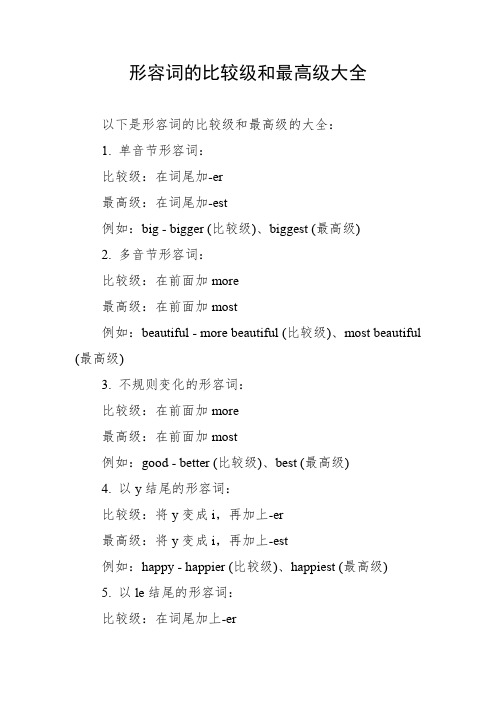
形容词的比较级和最高级大全以下是形容词的比较级和最高级的大全:1. 单音节形容词:比较级:在词尾加-er最高级:在词尾加-est例如:big - bigger (比较级)、biggest (最高级)2. 多音节形容词:比较级:在前面加more最高级:在前面加most例如:beautiful - more beautiful (比较级)、most beautiful (最高级)3. 不规则变化的形容词:比较级:在前面加more最高级:在前面加most例如:good - better (比较级)、best (最高级)4. 以y结尾的形容词:比较级:将y变成i,再加上-er最高级:将y变成i,再加上-est例如:happy - happier (比较级)、happiest (最高级)5. 以le结尾的形容词:比较级:在词尾加上-er最高级:在词尾加上-est例如:possible - more possible (比较级)、most possible (最高级)6. 少数不规则变化的形容词:比较级:在前面加more最高级:在前面加most例如:famous - more famous (比较级)、most famous (最高级)7. 特殊的比较级和最高级:例如:well - better (比较级)、best (最高级)8. 副词的比较级和最高级:比较级:在后面加-er最高级:在后面加-est例如:slowly - more slowly (比较级)、most slowly (最高级)以上是常见的形容词的比较级和最高级,但是也有一些不规则变化的形容词需要记忆。
同时,需要注意的是,有些形容词没有比较级和最高级,如unique。
- 1、下载文档前请自行甄别文档内容的完整性,平台不提供额外的编辑、内容补充、找答案等附加服务。
- 2、"仅部分预览"的文档,不可在线预览部分如存在完整性等问题,可反馈申请退款(可完整预览的文档不适用该条件!)。
- 3、如文档侵犯您的权益,请联系客服反馈,我们会尽快为您处理(人工客服工作时间:9:00-18:30)。
形容词比较级形容词比较级在八年级上是一个大的语法项目,在历年的中招考试单项选择中必有一题,而且出题方法相当灵活。
而现行课本只有A>B结构,这就要求老师在平时的教学中善于归纳总结,考虑周全,在教会学生基本结构的同时,适当进行拓展。
一.形容词比较级的变化规则:1. 一般情况直接+er2. 以e结尾的+r eg: nice, large,fine, late, cute3. 以一个辅音字母结尾的重读闭音节双写尾辅音字母+er eg: fat, thin, big, hot, red, wet, sad4. 以一个辅音字母加y结尾的改y为i+er eg: happy, healthy, angry, hungry, early, busy, curly5. 三个及三个音节以上的多音节词及两个音节的派生词在它的前面加moreeg : athletic, quickly, interesting, difficult, beautiful, delicious, serious, popular, quickly, lovely.不规则变化:good—better well—better bad—worse badly—worse ill—worse little—less far—farther/ further old—older/ elder练习: 写出下列词的形容词比较级:high- tall- short- slow- tired- boring-often- few- clean- fine- late- nice-big- thin- fat- easy- funny- early- beautiful- interesting- outgoing- comfortable- successful-good- bad- fast- badly- many-far- important- old- tall--- quiet---heavy-- outgoing--- athletic--- interesting--- different---二.形容词比较级基本句型:1. 主语+be+形容词的比较级+than +…•Tina is taller than Tera.•She is quieter than he \ him.•Pedro is funnier than Paul.•My pen is nicer than his.•Tom is more athletic than Sam.•My father is more serious than my mother.2. 形容词比较级前还可用much, a lot, even, still, a little, 来修饰, 表示“…的多”, “甚至…”, “更…”, “…一些”。
eg: This city is much more beautiful than before.She’s a little more outgoing than me.It’s a little colder today.3. the + 比较级+ of …..“(两者中)较…..的一个”eg: My sister is the taller of us. 我妹妹是我们当中较高的一个。
The skirt is the more beautiful of the two. 这条裙子是这两个当中更漂亮的一条。
3. “比较级+and+比较级”意为“越来越…”.多音节比较级用“more and more+形容词原级”形式。
It’s getting worse and worse.The group became more and more popular.4. “Which / Who is + 比较级…?”比较A、B两事物, 问其中哪一个较…时用此句型。
e.g. Which T-shirt is nicer, this one or that one?Who is more active, Mary or Kate?5. The + 比较级……, the + 比较级……意为“越……越……”eg:The more, the better. 越来越好。
The more you exercise, the fitter you will be. 你锻炼得越多, 你就越健康.背会下列比较级常见的句型:1.Ann is stronger than me and she runs faster than me.2.Ann is more careful than me and she listens to the teacher more carefully than me.3.Ann is the taller of the two girls.4.Ann is as easygoing as me.5. Ann is not as/so outgoing as me.6.Ann doesn’t get up so early as me.7.Ann is more friendly than any other student in her class.=Ann is more friendly than the other students.=Ann is the most friendly in her class.=No other student in her class is as friendly as her.8.Ann is less interested in art than me.9.This room is twice as big as that one.10.China is becoming stronger and stronger.11.My hometown is becoming more and more beautiful.12.The busier he is, the happier he feels.13.The harder you work, the better grades you will get.14.Huanghe is the second longest river in China.15.China is one of the biggest countries in the world.16.My elder brother is two years older than me.17. The weather in Zhengzhou is hotter than that in Kunming in summer.18.I have a lot more apples than you.三.形容词比较级基本句型总结表:练习: 用所给词的适当形式填空。
1.He has _____ (short) and _____ (curly) hair than Sam.2. Tom is _________ (athletic) than Jim is.3. Lucy enjoys _____(tell) jokes, she is much_____ (funny) than others.4.My father is ________(good) at drawing than my mother.5.I am _____________(outgoing) than him.6.He is fat, but she is _______than him.7.Who is ______(tall), Jim or Tom?8.Summer is _____(hot) than winter.9.What subject is ____________(difficult), math or English?10.Tina is _______(funny), Tera is________than her.11.My teacher is ____________(serious) than my father.单项选择:1.If you want to be thinner and healthier, you’d better eat ____food and take ____exercise.A.more, fewerB. more, lessC. fewer, moreD. less, more2. He is ___of the two boys.A.tallB. tallerC. tallestD. the taller3.He’s not so ____as his brother.A.strongB. strongerC. the strongerD. the strongest4. Mum, this T-shirt is much too small for me. Would you buy me a ____one?A.goodB. betterC. largeD. larger5.Which do you like ____, tea or coffee?A.goodB. betterC. bestD. the better6.The blue skirt is than the white one.A. dearB. expensiveC. much expensiveD. much more expensive7. Which would you like . this one or that one?A. veryB. wellC. betterD. good8. John can’t get up so as his little sister.A. earlierB. earlyC. more earlyD. very early9. This classroom is __________than that one.A. many bigB. much bigC. many biggerD. much bigger10.---Is your teethache getting better?---No, it’s__________.A.badB.seriousC.worseD.the worst 改错:1.Tony is much outgoing than Tom.2. I am so excited as you.3. Mary is taller of the twins.4. Our lessons are more difficult and more difficult.5. I’m not as funnier as my friend.6. Which is interesting, math or English?7. The city is very more beautiful than before.8. Tom’s homework i s more than Jim.四.我们可以用比较级的结构表示最高级的意义.A.比较级+ than +any other +名词单数Wang Fang is taller than any other girl in her class.=Wang Fang is the tallest girl in her class.B.比较级+than+any of the other+名词的复数I am lazier than any of the other students in my class.=I am the laziest student in my class.C.比较级+than+anyone elseHe speaks English more quickly than anyone else.=这种比较一定要排除自己,所以使用other,else等.如果前后比较的对象不属于同一范围,就不用other, else这些词.Shanghai is bigger than any city in Japan.D.No one+形容词或副词+than…No one swims better in this club than him.=E.否定词+比较级It can’t be worse=It is the worst.句型转换:1. Music is the most interesting of all the subjects. (同义句转换)Music is ____ _____ than ____ _____ subject.2. He is taller than any of the other boys in the class. (同义句转换)He is ____ ______ ______ in our class.3. She is the most popular of us. (同义句转换)She is _____ _____ than _____ _____.4. No one swims better than him. (同义句转换)He swims ______.1.He speaks English better than ____student in our class. ( any, any other)2. This is more difficult problem than _____.( anyone else, any other)3. I am taller than _____ students in our class.( any other, anyone else, any of the other)4. Zhengzhou is bigger than _____city in Henan.( any other, any, anyone else)5. Shanghai is bigger than _____city in Japan. (any other, any)。
